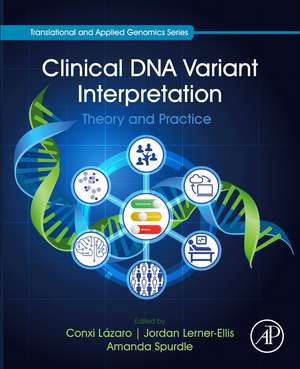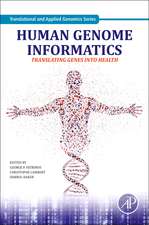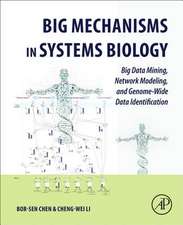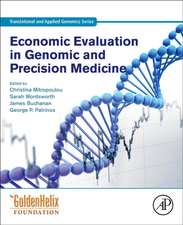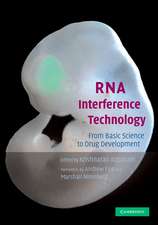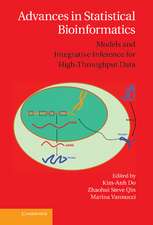Clinical DNA Variant Interpretation: Theory and Practice: Translational and Applied Genomics
Editat de Conxi Lázaro, Jordan Lerner-Ellis, Amanda Spurdle George P. Patrinosen Limba Engleză Paperback – 2 mar 2021
- Compiles best practices, methods and sound evidence for DNA variant classification in one applied volume
- Features chapter contributions from international leaders in the field
- Includes practical examples of variant classification for common and rare disorders, and across clinical phenotypes
Preț: 792.29 lei
Preț vechi: 1033.25 lei
-23% Nou
Puncte Express: 1188
Preț estimativ în valută:
151.60€ • 159.13$ • 125.83£
151.60€ • 159.13$ • 125.83£
Carte tipărită la comandă
Livrare economică 03-17 aprilie
Livrare express 06-12 martie pentru 100.96 lei
Preluare comenzi: 021 569.72.76
Specificații
ISBN-13: 9780128205198
ISBN-10: 0128205199
Pagini: 436
Ilustrații: 180 illustrations (50 in full color)
Dimensiuni: 191 x 235 x 27 mm
Greutate: 0.88 kg
Editura: ELSEVIER SCIENCE
Seria Translational and Applied Genomics
ISBN-10: 0128205199
Pagini: 436
Ilustrații: 180 illustrations (50 in full color)
Dimensiuni: 191 x 235 x 27 mm
Greutate: 0.88 kg
Editura: ELSEVIER SCIENCE
Seria Translational and Applied Genomics
Public țintă
Active researchers, basic and translational scientists, and clinicians in the areas of human genetics, genomics, reproductive medicine, gynecology, obstetrics, internal medicine, oncology, psychiatry, neurology, immunology, embryology, endocrinology, bioinformatics, prenatal testing, psychology, psychiatry, and genetic testing; genetic counselors; bioethicists; fertility specialists; hospital administratorsCuprins
1. Introduction: The challenge of genomic DNA interpretation
Section I. Theoretical Chapters
2. General considerations: Terminology and standards
3. International consensus guidelines for constitutional sequence variant interpretation
4. Quantitative modelling: Multifactorial integration of data
5. Clinical and genetic evidence and population evidence
6. The computational approach to variant interpretation: principles, results, and applicability
7. Functional evidence (I) transcripts and RNA splicing outline
8. Functional evidence (II) protein and enzyme function
9. Somatic data usage for classification of germline variants
10. Pharmacogenomics and personalized medicine
11. Data sharing and gene variant databases
12. Approaches to the comprehensive interpretation of genome-scale sequencing
13. Phenotype evaluation and clinical context: Application of case-level data in genomic variant interpretation
Section II. Practical Chapters
14. Inherited cardiomyopathies
15. Phenylketonuria
16. Hearing loss
17. Familial hypercholesterolemia
18. Classification of genetic variants in hereditary cancer genes
19. RASopathies
20. Summary and conclusions
Section I. Theoretical Chapters
2. General considerations: Terminology and standards
3. International consensus guidelines for constitutional sequence variant interpretation
4. Quantitative modelling: Multifactorial integration of data
5. Clinical and genetic evidence and population evidence
6. The computational approach to variant interpretation: principles, results, and applicability
7. Functional evidence (I) transcripts and RNA splicing outline
8. Functional evidence (II) protein and enzyme function
9. Somatic data usage for classification of germline variants
10. Pharmacogenomics and personalized medicine
11. Data sharing and gene variant databases
12. Approaches to the comprehensive interpretation of genome-scale sequencing
13. Phenotype evaluation and clinical context: Application of case-level data in genomic variant interpretation
Section II. Practical Chapters
14. Inherited cardiomyopathies
15. Phenylketonuria
16. Hearing loss
17. Familial hypercholesterolemia
18. Classification of genetic variants in hereditary cancer genes
19. RASopathies
20. Summary and conclusions
